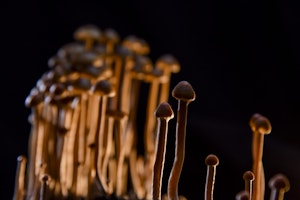
Scientists Reveal Magic Mushrooms Existed For Over 60 Million Years Before Humans
Fungi: the elders of earth.
In a groundbreaking study published in the Proceedings of the National Academy of Sciences (PNAS), scientists have embarked on the largest-ever genomic exploration of magic mushrooms.
Examining over 50 species from the Psilocybe genus, renowned for their psychedelic properties, this research offers unprecedented insights into the evolutionary history and complex genetics of these fascinating fungi.
While psilocybin, a key compound in these mushrooms, has become a buzzword in both recreational and medicinal circles, much of the Psilocybe family remains unexplored.
This study, however, takes a giant leap in understanding, revealing that the mushrooms date back about 65 million years, predating humans by a significant margin (around 63 million years)!

Photo By: Illinois University
A striking discovery from this research is the dual pathways through which Psilocybe mushrooms have evolved to produce psilocybin. Typically, fungi use a sequence of four enzymes, each triggering the next, to synthesize psilocybin. But this study has found an alternative genetic arrangement controlling this process – a revelation that could revolutionize how biotechnology companies approach making synthetic psilocybin.
This understanding of genetic diversity in Psilocybe mushrooms isn’t just academic curiosity. As Alistair McTaggart, a renowned mycologist from The University of Queensland, points out, it can deeply enhance our grasp of the psychedelic experience itself.
The study also brings into focus an intriguing question: If psilocybin’s profound impact on human consciousness is a relatively recent discovery, and these mushrooms predate humans by millions of years, what was the original purpose of this compound?
It’s clear that the evolution of psilocybin in magic mushrooms wasn’t initially for human interaction, suggesting a need to explore the ecological and evolutionary functions of psilocybin beyond its effects on human consciousness.
With a blend of scientific precision and a thirst for the unknown, the research team continues to map out the genetic secrets of all 165+ Psilocybe species.
Herb Recommended Products:
READ MORE










